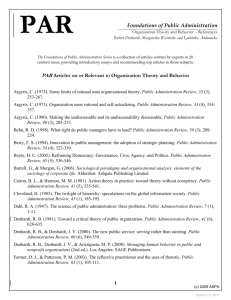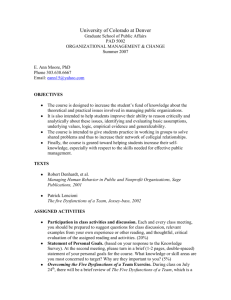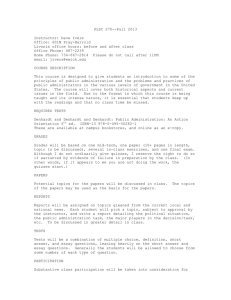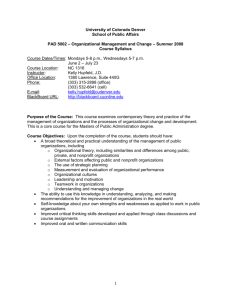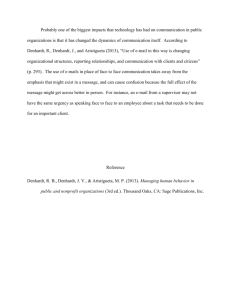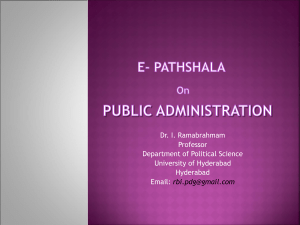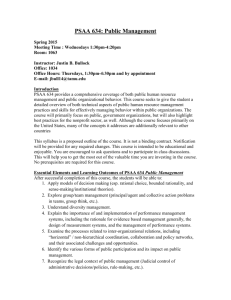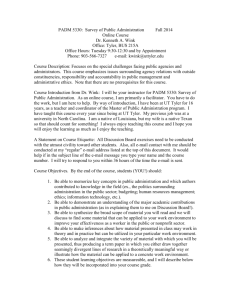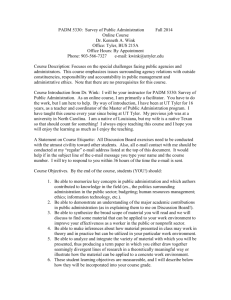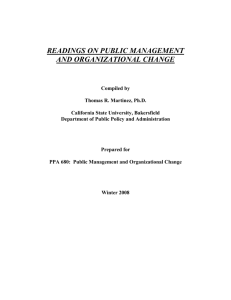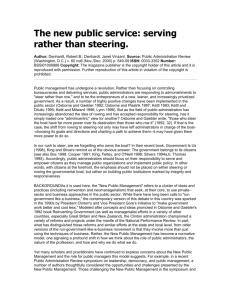Foundations of Public Administration 1 Syllabus for
advertisement
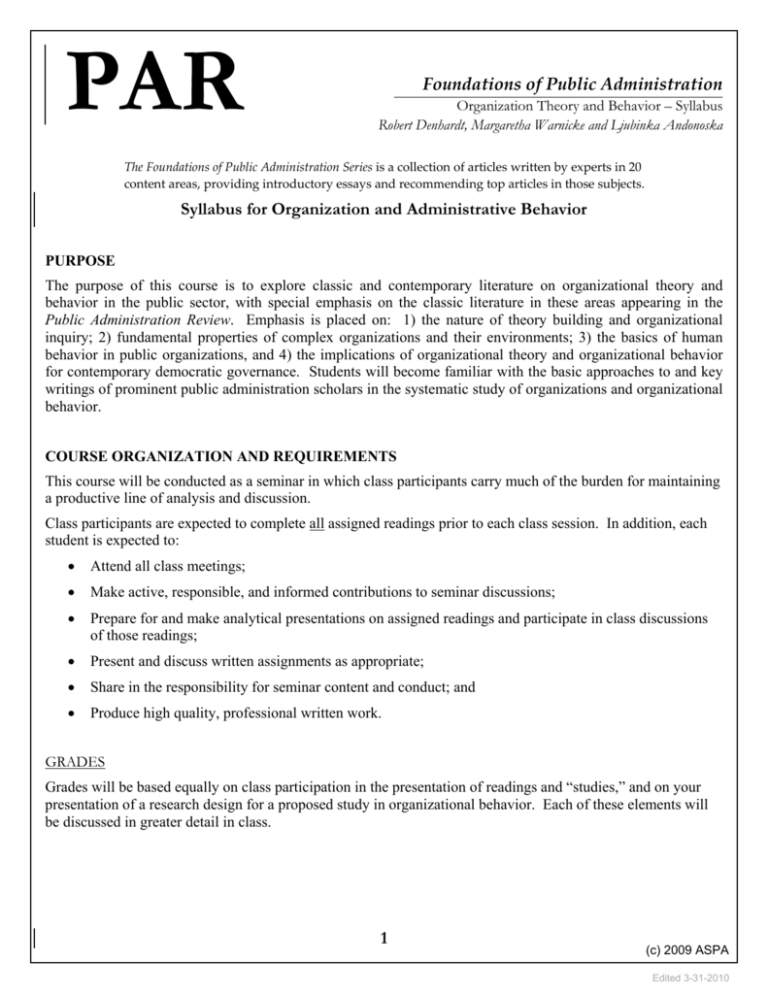
PAR Foundations of Public Administration Organization Theory and Behavior – Syllabus Robert Denhardt, Margaretha Warnicke and Ljubinka Andonoska The Foundations of Public Administration Series is a collection of articles written by experts in 20 content areas, providing introductory essays and recommending top articles in those subjects. Syllabus for Organization and Administrative Behavior PURPOSE The purpose of this course is to explore classic and contemporary literature on organizational theory and behavior in the public sector, with special emphasis on the classic literature in these areas appearing in the Public Administration Review. Emphasis is placed on: 1) the nature of theory building and organizational inquiry; 2) fundamental properties of complex organizations and their environments; 3) the basics of human behavior in public organizations, and 4) the implications of organizational theory and organizational behavior for contemporary democratic governance. Students will become familiar with the basic approaches to and key writings of prominent public administration scholars in the systematic study of organizations and organizational behavior. COURSE ORGANIZATION AND REQUIREMENTS This course will be conducted as a seminar in which class participants carry much of the burden for maintaining a productive line of analysis and discussion. Class participants are expected to complete all assigned readings prior to each class session. In addition, each student is expected to: Attend all class meetings; Make active, responsible, and informed contributions to seminar discussions; Prepare for and make analytical presentations on assigned readings and participate in class discussions of those readings; Present and discuss written assignments as appropriate; Share in the responsibility for seminar content and conduct; and Produce high quality, professional written work. GRADES Grades will be based equally on class participation in the presentation of readings and “studies,” and on your presentation of a research design for a proposed study in organizational behavior. Each of these elements will be discussed in greater detail in class. 1 (c) 2009 ASPA Edited 3-31-2010 PAR Foundations of Public Administration Organization Theory and Behavior – Syllabus Robert Denhardt, Margaretha Warnicke and Ljubinka Andonoska TEXTS Burrell, G., & Morgan, G. (2006). Sociological paradigms and organisational analysis: elements of the sociology of corporate life. Aldershot: Ashgate Publishing Limited. Denhardt, R. B., Denhardt, J. V., & Aristigueta, M. P. (2008). Managing human behavior in public and nonprofit organizations (2nd ed.). Los Angeles: SAGE Publications. Each session will be based on “Background” material drawn from these texts followed by “Articles” drawn primarily from the Public Administration Review. ASSIGNMENTS Session One – Positivist Organization Theory Background Burrell & Morgan: Introduction, Chapters 1-5. Articles Simon, H. A. (1946). The proverbs of administration. Public Administration Review, 6 (1), 53-67. Dahl, R. A. (1947). The science of public administration: three problems. Public Administration Review, 7 (1), 1-11. Simon, H. A. (1947). A comment on "the science of public administration". Public Administration Review, 7 (3), 200-203. Session Two – Interpretive Organization Theory Background Burrell & Morgan: Chapters 6-7. Articles Argyris, C. (1973). Some limits of rational man organizational theory, Public Administration Review, 33 (3), 253-267. Simon, H. A. (1973). Organizational man: Rational or self-actualizing?, Public Administration Review, 33 (4), 346-353. Argyris, C. (1973). Organizational man: rational and self-actualizing?, Public Administration Review, 33 (4), 354-357. Catron, B. L., & Harmon, M. M. (1981). Action theory in practice: Toward theory without conspiracy. Public Administration Review, 41 (5), 535-541. 2 (c) 2009 ASPA PAR Foundations of Public Administration Organization Theory and Behavior – Syllabus Robert Denhardt, Margaretha Warnicke and Ljubinka Andonoska Session Three – Critical Organization Theory Background Burrell & Morgan: Chapters 8-9. Articles Scott, W. G. (1969). Organization government: The prospects for a truly participative system. Public Administration Review, 29 (1), 43-53. Ramos, A. G. (1972). Models of man and administrative theory. Public Administration Review, 32 (3), 241-246. Denhardt, R. B. (1981). Toward a critical theory of public organization. Public Administration Review, 41 (6), 628-635. Korten, D. C. (1984). Strategic organization for people-centered development. Public Administration Review, 44 (4), 341-352. Session Four – Post-Modern Organization Theory Background Burrell & Morgan: Chapters 10-11. Articles White, O. F. Jr, (1969). The dialectical organization: An alternative to bureaucracy. Public Administration Review, 29 (1), 32-42. Argyris, C. (1980). Making the undiscussable and its undiscussability discussable. Public Administration Review, 40 (3), 205-213. Farmer, D. J., & Patterson, P. M. (2003). The reflective practitioner and the uses of rhetoric. Public Administration Review, 63 (1), 105-111. Session Five – Contemporary Issues: Networks and Organizations Background Denhardt, Denhardt, & Aristigueta: Chapters 1-4. Articles Provan, K. G. H. Milward, B. (2001). Do networks really work? A framework for evaluating publicsector organizational networks. Public Administration Review, 61 (4), 414-423. Meier, K. J. , & O'Toole, L. J. Jr. (2003). Public management and educational performance: The impact of managerial networking. Public Administration Review, 63 (6), 689-699. 3 (c) 2009 ASPA PAR Foundations of Public Administration Organization Theory and Behavior – Syllabus Robert Denhardt, Margaretha Warnicke and Ljubinka Andonoska Session Six – Topics in Organizational Behavior : The Context Background Denhardt, Denhardt, & Aristigueta: Chapters 8, 13-14. Articles Golembiewski, R. T. (1960). O & m and the small group. Public Administration Review, 20 (4), 205212. Landau, M. (1969). Redundancy, rationality, and the problem of duplication and overlap. Public Administration Review, 29 (4), 346-358. Kaufman, H. (1973). The direction of organizational evolution. Public Administration Review, 33 (4), 300-307. Montjoy, R. S., & O'Toole, L.J. Jr, (1979). Toward a theory of policy implementation: An organizational perspective. Public Administration Review, 39 (5), 465-476. Session Seven – Topics in Organizational Behavior: The Individual Actor Background Denhardt, Denhardt, & Aristigueta: Chapters 5-6. Articles Simon, H. A. (1965). Administrative decision making. Public Administration Review, 25 (1), 31-37. Schott, R. L. (1986). The psychological development of adults: Implications for public administration, Public Administration Review, 46 (6), 657-667. Perry, J. L., & Wise, L. R. (1990). The motivational bases of public service. Public Administration Review, 50 (3), 367-373. Behn, R. D. (1998). What right do public managers have to lead?. Public Administration Review, 58 (3), 209-224. Session Eight – Topics in Organizational Behavior: Leadership and Organizational Change Background Denhardt, Denhardt, & Aristigueta: Chapters 7, 9, 12. Articles Long, N. E. (1949). Power and administration. Public administration review, 9 (4), 257-264. Presthus, R. V. (1960). Authority in organizations. Public administration review, 20 (2), 86-91. Cleveland, H. (1985). The twilight of hierarchy: Speculations of global information society. Public 4 (c) 2009 ASPA PAR Foundations of Public Administration Organization Theory and Behavior – Syllabus Robert Denhardt, Margaretha Warnicke and Ljubinka Andonoska administration review, 45 (1), 185-195. Van Wart, M. (2003). Public-sector leadership theory: An assessment. Public administration review, 63 (2), 214-228. Fernandez, S., & Rainey, H. G. (2006). Managing successful organizational change in the Public Sector. Public administration review, 66 (2), 168-176. Session Nine – Topics in Organizational Behavior: Managerial Techniques Background Denhardt, Denhardt, & Aristigueta: 10-11. Articles Golembiewski, R.T. (1969). Organizational development in public agencies: Perspectives on Theory and Practice. Public administration review, 29 (4), 367-377. Kirkhart, L., & White, O. F. Jr. (1974). The future of organizational development. Public administration review, 34 (2), 129-140. Sherwood, F. P., & Page, W. J. Jr. (1976). MBO and public management. Public administration review, 36 (1), 5-12. Levine, C. (1978). Organizational decline and cutback management. Public administration review, 38 (4), 316-325. Swiss, J.E. (1992). Adapting total quality management (tqm) to government. Public administration review, 52 (4), 356-362. Berry, F. S. (1994). Innovation in public management: The adoption of strategic planning. Public administration review, 54 (4), 322-330. Session Ten – Implications of Organization Theory and Behavior for Democratic Governance: Framing the Issue Articles Levitan, D.M. (1943). Political ends and administrative means. Public administration review, 3 (4), 353359. Golembiewski, R.T. (1962). Organization as a moral problem. Public administration review, 22 (2), 5158. Waldo, D.C. (1968). Public administration in a time of revolution. Public administration review, 28 (4), 362-368. Kaufman, H. (1969). Administrative decentralization and political power. Public administration review, 29 (1), 3-15. 5 (c) 2009 ASPA PAR Foundations of Public Administration Organization Theory and Behavior – Syllabus Robert Denhardt, Margaretha Warnicke and Ljubinka Andonoska Kaufman, H. (1981). Fear of bureaucracy: A ranging pandemic. Public administration review, 41 (1), 19. Rosenbloom, D. H. (1983). Public administrative theory and separations of powers. Public administration review, 43 (3), 219-227. Goodsell, C.T. (1992). The public administrator as artisan. Public administration review, 52 (3), 246253. Gawthrop, L. C. (1997). Democracy, bureaucracy, and hypocrisy redux: A search for sympathy and compassion. Public administration review, 57 (3), 205-210. Session Eleven – Implications of Organization Theory and Administrative Behavior for Democratic Governance: Contemporary Debates Articles Kaboolian, L. (1998). The New Public Management: Challenging the boundaries of the management vs. administration debate. Public administration review, 58 (3), 189-193. Kettl, D.F. (2000). The transformation of governance: Globalization, devolution, and the role of government. Public administration review, 60 (6), 488-497. Denhardt, R.B., & Denhardt, J. V. (2000). The New Public Service: Serving rather than steering. Public administration review, 60 (6), 549-559. Kirlin, J. J. (2001). Big questions for a significant public administration. Public administration review, 61 (2), 140-143. Boyte, H. C. (2005). Reframing democracy: Governance, civic agency, and politics. Public administration review, 65 (5), 536-546. Kettl, D. F. (2006). Managing boundaries in american administration: the collaboration imperative. Public administration review, 66 (s1), 10-19. Wichowsky, A., & Moynihan, D. P. (2008). Measuring how administration shapes citizenship: a policy feedback perspective on performance management. Public administration review, 68 (5), 908920. Session Twelve Student Presentations Session Thirteen Student Presentations 6 (c) 2009 ASPA PAR Foundations of Public Administration Organization Theory and Behavior – Sylllabus Robert Denhardt, Margaretha Warnicke and Ljubinka Andonoska About the Authors Robert B. Denhardt Is an ASU Regents Professor, Lincoln Professor of Leadership and Ethics and Director of the School of Public Affairs at Arizona State University. He is also a Distinguished Visiting Scholar at the University of Delaware. rbd@asu.edu Margaretha Warnicke is a doctoral student in the School of Public Affairs at Arizona State University. She has a master’s degree in history from the University of Delaware. margaretha.warnicke@asu.edu Ljubinka Andonoska is a doctoral student in the School of Public Affairs at Arizona State University. She has a master’s degree in public administration from Arizona State University. ljubinka.andonoska@asu.edu 7 (c) 2009 ASPA
